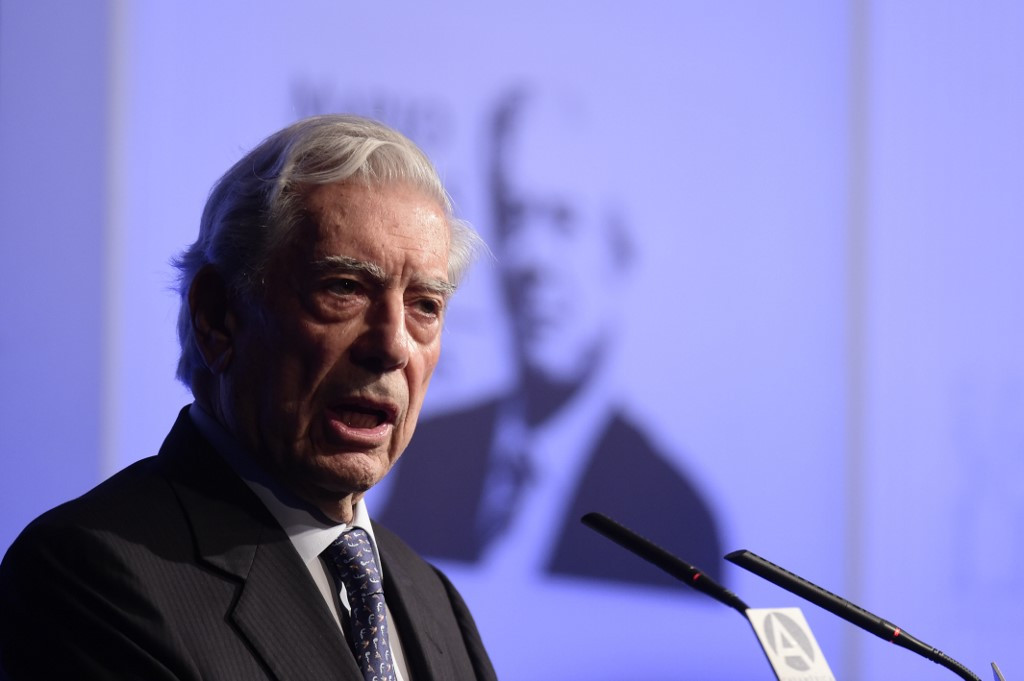Popular Reads
Top Results
Can't find what you're looking for?
View all search resultsPopular Reads
Top Results
Can't find what you're looking for?
View all search resultsPolitical clash mars esteemed Spanish-language literature prize
The Venezuelan literature prize Romulo Gallegos was once one of the most prestigious in Latin America and the Spanish-language world.
Change text size
Gift Premium Articles
to Anyone
 In this file photo taken on March 29, 2016 Peruvian writer and 2010 Literature Nobel Prize Mario Vargas Llosa -- winner of the Romulo-Gallegos prize in 1967-- delivers a speech at Casa de America during a seminar titled 'Vargas Llosa: Culture, ideas and freedom' as part of the celebrations for his 80th birthday, in Madrid. (AFP/Javier Soriano)
In this file photo taken on March 29, 2016 Peruvian writer and 2010 Literature Nobel Prize Mario Vargas Llosa -- winner of the Romulo-Gallegos prize in 1967-- delivers a speech at Casa de America during a seminar titled 'Vargas Llosa: Culture, ideas and freedom' as part of the celebrations for his 80th birthday, in Madrid. (AFP/Javier Soriano)
T
he Venezuelan literature prize Romulo Gallegos was once one of the most prestigious in Latin America and the Spanish-language world, with writers such as Mario Vargas Llosa, Gabriel Garcia Marquez and Roberto Bolano among its winners.
But ahead of its awarding in November for the first time in five years, a politically polarized debate is raging between Venezuela's authorities and those opposed to the "dictatorship".
Usually given out once every two years, the Romulo Gallegos -- named after a Venezuelan novelist and statesman -- was first awarded in 1967 to Peruvian Vargas Llosa, who would win the Nobel Prize for Literature in 2010.
"It's a prize that quickly acquired great prestige because it became the 'boom' prize," Gustavo Guerrero, Spanish-language editor at French publishing house Editions Gallimard, told AFP.
The "boom" refers to Venezuela's golden years in the 1960s and 1970s, when oil revenue propelled its economy to among the top in Latin America.
"It was the era of liberal democracy," said Guerrero, a Venezuelan.
The Romulo Gallegos award passed from one set of illustrious hands to another as Colombian Garcia Marquez picked it up in 1972 and Mexican Carlos Fuentes followed in 1977.
Things started to change during the reign of late former president Hugo Chavez (1999-2013) as in 2005 "the Venezuelan government intervened in the formation of the prize's jury," said Guerrero.
Cuba, a staunch Chavez ally, even "imposed members of the jury. From that point you felt the prize was starting to lose its autonomy".
With the first award since 2015 due soon, a flurry of criticism is drowning out literary merits being judged.
For Venezuelan novelist Rodrigo Blanco Calderon, who lives in Spain, the prize is nothing more than "a propaganda instrument to legitimize the Chavist dictatorship" of President Nicolas Maduro.
The young writer points to the "massacres" of students during anti-regime demonstrations in 2014 and 2017, the "mass exodus" of Venezuelans and last year's report by the UN's High Commissioner for Human Rights that warned of the "erosion of the state of law" in Venezuela, as reasons to boycott the award.
Read also: ‘Extremists polarize humanity, storytellers do exact opposite’: Elif Shafak
'Born politicized'
"The jurors are all in one way or another affiliated to Chavism. It's practically the kidnapping of a prize," said Blanco Calderon.
Alongside other authors, chiefly Venezuelans, he's called on colleagues not to buy into the "farce."
"You only need to look at the works in contention to see that the Romulo Gallegos prize has become a hotel for tourists of the Chavist dictatorship," he wrote on Twitter.
Fellow Venezuelan living in exile, Maria Perez-Talavera, withdrew her novel "Eran de Madera" to avoid becoming "an instrument of a politicized literature platform."
That elicited a stern rebuke from the Romulo Gallegos Center of Latin American Studies, which hands out the award.
"The prize was born politicized," it said in a statement titled "Cultural Trumpism."
Curiously, the statement mainly attacks US President Donald Trump, accusing him of "aggression" in the middle of the coronavirus pandemic and of trying to "destroy" the award.
One of the jury members, Colombian writer Pablo Montoya, the last award winner in 2015, hit back at the accusations in a column in Colombian newspaper El Tiempo.
"It's wrong to say that we -- jurors and candidates -- are the sorry pawns of a regime," he said.
Just under 200 writers are in the running, but not Venezuela's Karina Sainz Borgo.
"I won't legitimize a regime that isn't democratic," the author of the book The Daughter of the Spaniard, told AFP.
And given the gaping hole in the regime's finances, she added: "I'm not even sure they can pay the prize," which is worth around $95,000.










